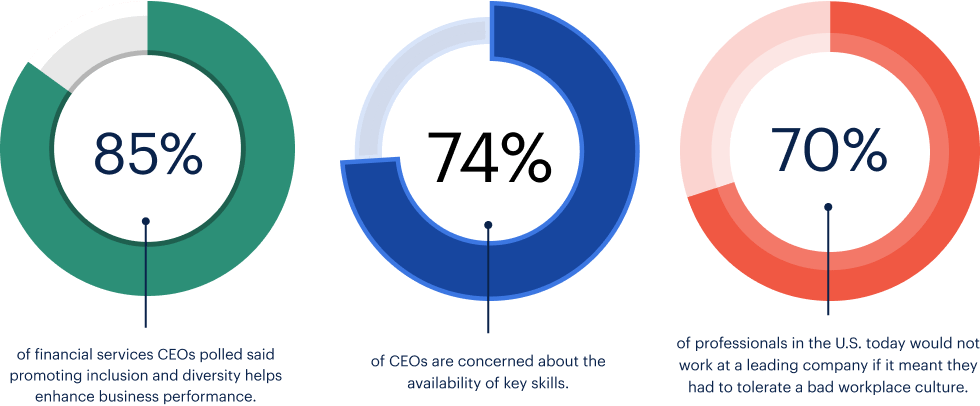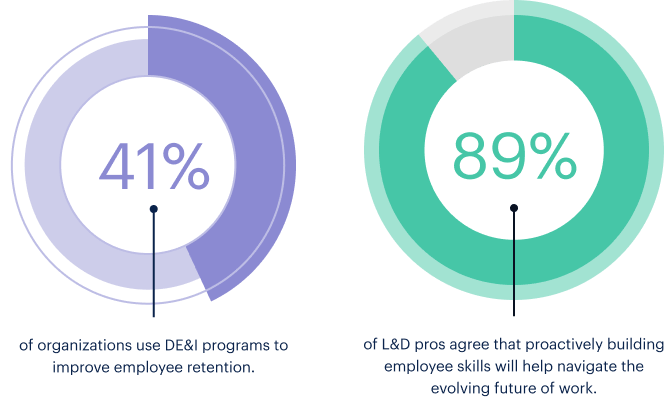
The role of HR has never been more important, with the financial services industry having to make some extensive changes in the past few years. Creating sustainable and scalable solutions that prioritize employee personal and professional development has become more critical than ever.
What Are The Biggest Challenges The Industry Is Facing?
The financial services industry faces a competitive labor market, and it will take strategy and adaptability to stay ahead. HR professionals are noticing not only the need for core competencies such as agility, resilience, and technological proficiency but also the value of diverse perspectives and an increased focus on employee well-being, career development, and engagement.
Challenge 1 – Hiring & Retaining Talent
Like every other industry, the often high-pressure financial sector has seen its share of hiring challenges. According to a survey conducted by Deloitte, 82.3% of hiring managers at public companies expect they’ll have to work hard in the next year to attract and retain employees. With new technologies emerging and new generations joining the workforce, Human Resource leaders must examine their hiring and retention strategies holistically.
Challenge 2 – Diversity & Inclusion
While more financial organizations are recognizing the value of diversity and taking the steps to improve, progress has been slow. Research from McKinsey & Company shows that 52% of entry-level financial services professionals are women. However, that percentage shrinks as roles become more senior, especially for women of color, where representation for Black, Latina, and Asian women falls by a staggering 80% from entry-level to C-suite. Despite some progress, 64% of financial-services C-suite executives are still White men, and 23% are White women—leaving just 9% of C-suite positions held by men of color and 4% by women of color.
Challenge 3 – Skills Gap
With new technologies emerging and new generations joining the workforce, the skills gap in the finance industry is continuously widening. As new technology and software continue to change, staff also need to be upskilled to learn how to use it. At the same time, HR departments must create more upward mobility within their organization, which reduces recruiting and onboarding costs.
Challenge 4 – Company Culture
In an industry that focuses primarily on building wealth and growing its customer base, oftentimes, employees feel overworked and under-appreciated. Therefore, employees are now demanding more from their employers than just a paycheck. In fact, 40% of global candidates say colleagues and company culture are a top priority when picking a job. With burnout on the rise, an increase in digitization, and a massive switch to remote work, the power of company culture should be valued.

TaskHuman’s Solutions
New generations of talent join the workforce and expect a different kind of workplace. With the use of the TaskHuman platform, your organization can improve employee engagement, company culture, training, and talent development opportunities. An increased focus on people will allow the financial services industry and its workforce to grow.
Solutions To Hiring & Retaining Talent:
Considering the competitive job market, the financial services industry will have to put its best foot forward when it comes to recruiting talent. Organizations can do so by expanding the hiring pool and focusing on empowering their employees as a whole. By providing development opportunities, Diversity, Equity, Inclusion, and Belonging (DEIB) initiatives, career advancement, and implementing a flexible well-being program, HR departments can more easily attract talent that will want to grow and develop within the company.
Resources for HR Leaders:
Best Well-being Program Practices Checklist
Diversity, Equity, Inclusion, & Belonging Checklist
Solutions To Diversity & Inclusion:
Workers have made it clear that DEIB matters, employees are 47% more likely to stay with an organization if it’s inclusive. Who people work with, and work for, is important – employers should not underestimate those working relationships. HR departments can support and empower an inclusive workplace by implementing DEIB programs and robust Employee Resource Groups (ERG). ERGs act as culture-builders that can create a sense of community and drive change toward a more equitable workplace. ERGs can work hand in hand with DEIB initiatives, and when done right, they drive the organization’s culture, increases employee engagement, and empowers productivity.
Resources for HR leaders:
The TaskHuman Guide To Employee Resource Groups (ERGs)
Watch On-Demand: Introduction To Diversity, Equity, Inclusion, and Belonging (DEIB) Programs
Solutions To Skills Gap:Empowering an organization’s learning culture is vital. To help their aging workforce adjust, finance companies will have to invest in reskilling and upskilling. An SHRM report studying the finance, insurance, and real estate industries found that 43% of HR professionals were beginning to examine their organizations’ policies and practices to prepare for their aging workforce. With younger generations joining the workforce and technology advances, HR departments must support knowledge transfer. Upskilling and mentoring existing workers creates a more multi-functional and efficient workforce. HR departments can support this initiative by providing real-time access to mentorship and leadership development.
Resources for HR leaders:
Why Mentorship Matters To Company Growth
Solutions To Company Culture:
Positive company culture will enhance a financial institution’s reputation with its customers, attract and retain highly qualified talent, and promote positive changes with more innovation. There is no question that a positive, innovative culture is critical to the continued success of any company. In order to achieve this, HR must develop and implement strategies that keep employees empowered, productive, and engaged. In addition to ERGs and DEIB initiatives, effective engagement strategies include regular one-on-ones, consistent feedback and praise, tangible goals, and career development. Managers and leaders must be equipped with proper training to develop soft skills and implement such strategies.
Resources for HR leaders:
A Guide To Developing An Adaptable Leadership Framework
Strengthen Company Culture During Restructuring

TaskHuman Delivers Results:Generated Operational Impacts Across the Business Unit
The TaskHuman platform was rolled out to a financial services client to support personal and professional development. With a total satisfaction rate of 4.9/5, hear firsthand from some of the employees who have leveraged the TaskHuman platform and how it has impacted their lives.
Testimonial 1 | Testimonial 2 | Testimonial 3
Employee Growth & Support At Scale
The TaskHuman platform connects a global network of professional expertise to your employees, unlocking their fullest potential, improving performance and engagement, and providing preventative support – instantly.
Sources: PWC LinkedIn LinkedIn LinkedIn
[hubspot type=cta portal=8109744 id=f6c644b4-ae9e-48c1-8264-9897e5509051]